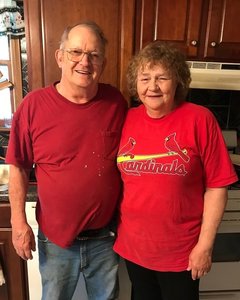John Rich of Willow Hill is one of the lucky ones.
He suffered a massive stroke in October and has recovered with just minor impairments. “I still have trouble remembering and I struggle with words at times, but I’m doing great,” he said. “I planted a garden yesterday.”
Rich was ordering lunch at a restaurant counter with his wife, Carolyn, when he became incredibly weak and sat down. “I could hear people talking, but I couldn’t move. I remember Carolyn asking me what I wanted on my sandwich, but I couldn’t speak,” he said.
His wife immediately got him some orange juice, first thinking his blood sugar had dropped because he is diabetic, but she knew it was more serious when he was unable to swallow. “The juice just ran down the side of his face,” she said.
Paramedics rushed to the scene and transported Rich by ambulance to the Emergency Department at Sarah Bush Lincoln. He was shocked when he later learned he was having a stroke. Rich received emergency drug therapy in the emergency room to dissolve blood clots causing the stroke and then airlifted for further treatment to St. John’s Hospital in Springfield.
After a weeklong hospital stay, Rich was transferred to a rehabilitation center in Champaign for a few weeks where he relearned to walk and talk before returning home. “I’m doing great,” he said. “The doctors told me I’m very lucky.”
Every minute-and-a-half, on average, someone in America suffers a stroke. That's 795,000 strokes a year; making it the third-ranking cause of death and the leading cause of disability. To generate greater stroke awareness, Sarah Bush Lincoln Neurologist Fatima Alao, MD, will discuss symptoms, risks factors and answer questions during a free lunch and learn from 11:30 am to 1 pm at the Lifespan Center, 11021 E. County Road 800N, Charleston.
Recognizing the signs and symptoms of stroke, and seeking medical attention immediately can allow doctors to more quickly identify the type of stroke a person is suffering, use the appropriate therapy and, ultimately, save more functionality for that person, according to Dr. Alao.
Often the person having the stroke doesn’t know what’s happening and can’t respond because the symptoms can be very subtle at the start. That makes bystanders or family members and friends the most important key to survival, she added.
Rich is grateful for receiving prompt care, which was key to his quick recovery. “I just didn’t expect something like this to happen to me,” he said. At 72, Rich loves to stay busy. “He rarely sits down,” his wife of 56 years said. He is receiving follow-up care with Sarah Bush Lincoln Family Practitioner Lucas Catt, MD, who recommended he continue with physical and speech therapy. However, his therapists have released him with exercises to complete at home because he’s doing so well. “Everyone has taken great care of me and I’m very thankful,” he said.
For more information, and to reserve a seat for the lunch and learn, please call Sarah Bush Lincoln Public Relations at 217-258-2420.

